
| Home | Contact Us |
 |
|
The Handmade ProcessHistory of Mulberry PaperThe Egyptians were using Papyrus around 3000 BC. But the first paper was developed in China during the Han Dynasty. Around 100 AD the Chinese made the first paper using mulberry bark fibers that were suspended in water and removed with a bamboo screen. The mulberry fibers dried on the screen forming a thick, natural paper. The first paper ever made was mulberry paper. Artisans have been making mulberry paper in Thailand for centuries. Mulberry trees grow wild in many parts of Thailand. Mulberry bark and small branches are harvested from the trees by hand without endangering the trees. The bark and smaller branches quickly grow back and can be harvested again. The process for producing mulberry paper is largely unchanged except for some modern dyes. Earthmade Paper works with artisans to create new products to provide unique and exotic products for our customers.Recent TrendsRecently mulberry paper has made a huge comeback. It's being used for cards, scrapbooking and other crafts. The fibers in the paper give crafting projects an exotic look and a natural texture. Mulberry paper makes a great background or boarder to highlight photos or other papers. Tearing mulberry paper provides an interesting ragged edge for scrapbook pages, cards and other crafts Whether it be Pineapple, Mulberry or Banana paper, it all starts out the same. This is a field of Pineapple plants in Southern Thailand.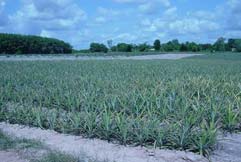 The leaves of the Pineapple and Banana trees are chopped down and burned or harvested for paper every 1 to 2 years. The bark of the mulberry tree can be harvested annually. This harvesting is a natural process and the plants and bark are regrown for the next season-making this process eco-friendly and totally sustainable. 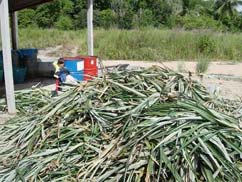 The leaves and bark are then chopped into smaller pieces for sorting and cleaning. 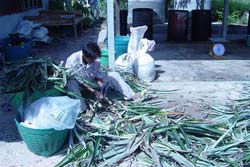 The mulberry bark in this bundle will be stored and used at a later date. 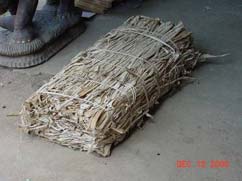 The leaves and bark are then washed in water. 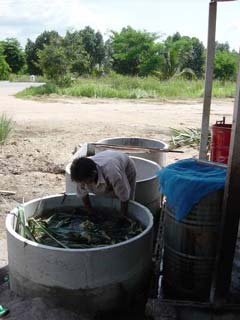 After they are washed they are boiled until they are soft and fibrous. 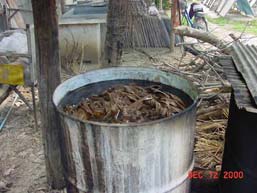 Once the fibers have been boiled they can be mulched into a thick fibrous pulp. 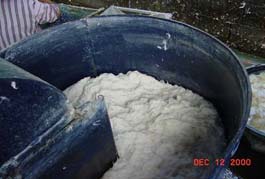 The dyes are then mixed to exact specifications for each color of paper. Indeed, even specific Pantone colors can be matched using this process! 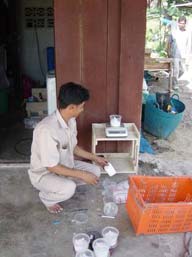 The dye and the pulp are then mixed into a tub of water with a screen just below the surface. 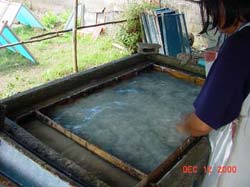 The screens are then raised from the water with the colored pulp clinging to one side. 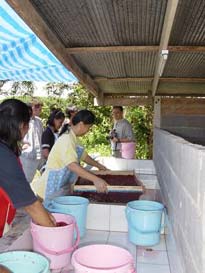 As the water drains off, the pulp is left in the screen, forming a wet "parent sheet" of handmade paper. 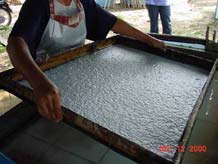 The wet screens are then left out to dry in the sun. Screens can also be heated or "fried" to dry more quickly. 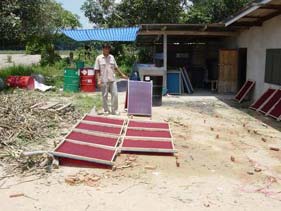 In the hot season, hundreds of sheets can be made in a single day! 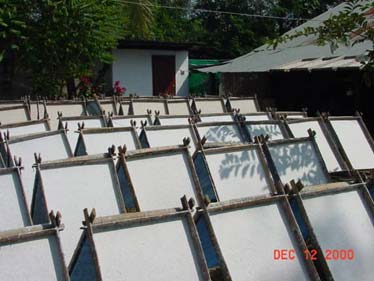 The dried paper is then pulled from the screen. It is ready to be cut in to smaller sheets and the screen can be used again. 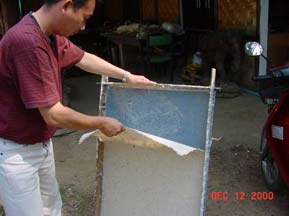 The pictures in this series are of an entirely manual process. And while some of this process is now being automated, the process is essentially the same. All of the photos were taken by the owners of Earthmade Paper between 12/2000 and 6/2003 in various locations in the North and South of Thailand. All international rights are reserved and text and photos are the property of Earthmade Paper. |
Earthmade Paper Company LLC imports exotic paper and craft embellishments from Asia to the US and Canada.
Members of EMP speak fluent Thai and Mandarin Chinese and have more than 15 years combined experience working in Asia.
We specialize in creating and customizing fine craft products for North American distributors.
Please contact us directly if you are a distributor in the craft or paper industry or if you are looking for help getting your product sourced in China or Thailand.
All others should contact one of our distributers to order EMP products.
|
|
Home . Limited Edition .
New . Color Diva's Teasers .
Custom Designed Products . Handmade Process . About Us . Contact Us . Events . Links . Papers . Terms and Conditions
© 2006 Earthmade Paper Company. All Rights Reserved Worldwide. |